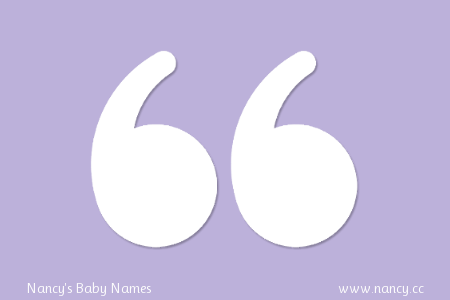Time for another batch of name quotes!
From a recent Deseret News article about Utah’s unusual baby names by Meg Walter:
Heather Marné Williams-Young is named after Marné Whitaker Tuttle. According to legend, Marné Whitaker Tuttle’s mother named her Marne (with no accent) after the French town on the frontlines of World War I, thinking Marne, which rhymes with barn, was a beautiful name.
But Marné disagreed, so she added the acute accent over the e, and pronounced it “Mar-nay.” “There is nothing more Utah to me than women of a certain generation trying make their names more French by putting accents places they shouldn’t be,” Williams-Young says.
[Marné Tuttle (1920-2014), the wife of LDS church leader A(lbert) Theodore Tuttle, served as “temple matron” in the Provo Utah Temple in the early 1980s. During that time, Heather’s mother worked as a Temple employee. Both Heather’s mother and Heather’s mother’s roommate ended up giving their future daughters the middle name Marné.]
“There are a handful of us around Utah County who were all named after the same woman with the made-up name,” Williams-Young says. “I feel such a kinship with them.”
[One of Marné Tuttle’s own daughters, Clarissa, was also given Marné as a middle.]
From a 2015 article in History Today about Anglo-Saxon personal names by James Chetwood:
While it is hard to tell exactly how important the meaning of name elements were, it seems likely that people were aware, to some extent, that names carried some kind of meaning. Indeed, one of the most famous, or infamous, Anglo-Saxons is most often known to us today as Ethelred the Unready, the king who lost his kingdom to Cnut. However, the name Ethelred signified ‘noble counsel’. So, when his contemporaries labelled him Æðelræd Unræd they were not calling him ‘unready’, but using the meaning of his name to mock his lack of good counsel. Similarly, when Archbishop Wulfstan entitled his homily to the English people ‘Sermon of the Wolf to the English’, he was clearly doing so in the knowledge that the first part of his name did not just sound like, but signified, ‘wolf’. Surely it cannot be coincidence that ‘rich’, ‘strong’ and ‘beautiful’ were used in names, where ‘poor’, ‘weak’ and ‘ugly’ were not.
A feature of this naming system was flexibility. There was a finite number of elements, but they could be combined in a multitude of ways. This meant that, in essence, a name was created for, rather than given to, each person. So, while elements could be repeated to emphasize parentage and family links, there was very little repetition of full names and it would be unlikely that any two people within a community or family would have the same name.
For more quotes about names, check out the name quotes category.

